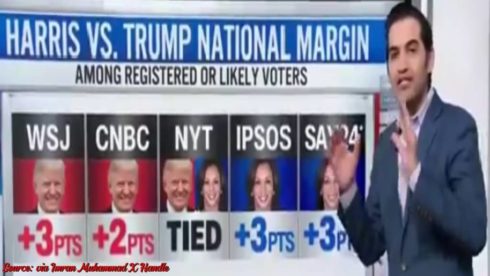According to CNN, Donald Trump is reportedly in a position to capture the popular vote, a feat no Republican has achieved in over two decades. This shift reflects a significant change in public sentiment, potentially reshaping historical voting trends. Donald Trump’s projected success in the popular vote suggests he could secure both broad appeal across demographics and a decisive advantage in the electoral college.
The GOP’s renewed energy has fueled this momentum, with support for Donald Trump surging in key states that traditionally swing Democratic. If these patterns hold through Election Day, Donald Trump would become the second Republican in 36 years to win the popular vote. This scenario marks a pivotal moment for the party as it seeks to reestablish itself as a majority force in American politics.
Electoral College Advantage Signals a Strong GOP Position
Polls indicate Donald Trump is not only advancing in the popular vote but also likely to secure a commanding win in the electoral college. Compared to his 2016 and 2020 campaigns, Donald Trump’s current standing represents a significant improvement, with increased support from both rural and suburban areas across battleground states.
While the final outcome remains to be seen, analysts suggest that Trump’s growing lead in the electoral college could signal a substantial GOP shift, reminiscent of his 2016 victory but potentially more widespread. The convergence of popular and electoral support would reinforce his position as a powerful force within the Republican party and reshape future GOP strategies.
GOP Sees Strong Early Voting Turnout in Key Swing States
The GOP has experienced unprecedented early voting success in pivotal states like Arizona, Nevada, and North Carolina, where Republicans currently lead. These numbers, showing increased enthusiasm among the GOP base, highlight voter commitment in states critical for a Trump victory.
This early voting boost for Republicans could offset Democratic strongholds and reduce their overall advantage, especially in historically contested regions. Early voter turnout in these states underscores the GOP’s strengthened ground game and suggests a broader, more organized push to secure these swing states.
Democratic Firewall Eroding in Pennsylvania
The Democratic firewall in Pennsylvania, a state crucial for the party, has shown signs of weakening. As of recent reports, the Democratic lead in early voting has dropped by 728,294 compared to 2020, an indicator that Republicans are gaining traction in a traditionally blue region.
The diminished Democratic lead in Pennsylvania highlights potential vulnerabilities that could impact their overall performance in this key state. If this trend continues, Pennsylvania might transition from a secure Democratic territory to a competitive battleground, further bolstering Donald Trump’s chances.
Donald Trump Outpaces His 2016 and 2020 Performance in Key Demographics
New polls reveal that Donald Trump is significantly outperforming his numbers from both the 2016 and 2020 elections, especially among working-class and independent voters. These groups, historically unpredictable, have shown an increased favorability toward Donald Trump, suggesting he has broadened his appeal since his last two campaigns.
This growth among swing voters could provide Donald Trump with a substantial advantage in capturing undecided voters. The marked improvement in his standing among key demographics points to a refined campaign strategy and messaging that resonates with more diverse voter groups.
Potential Implications of a Trump Popular Vote Victory
Should Donald Trump secure the popular vote, it would represent a seismic shift for the Republican Party, breaking a 20-year streak of Democratic dominance in this measure. For Donald Trump, a popular vote victory would not only be historic but could further solidify his legacy within the GOP.
A Republican popular vote win could have wide-reaching implications for U.S. politics, influencing future electoral strategies and signaling a potential realignment of party identities. This outcome may reshape campaign approaches as both parties adjust to the evolving political landscape in the United States.














